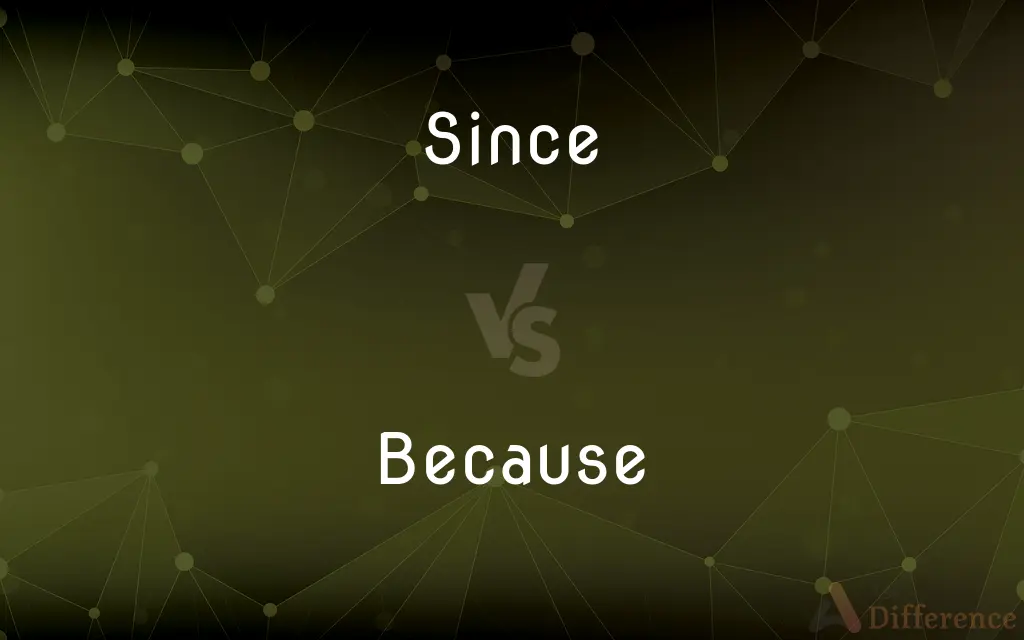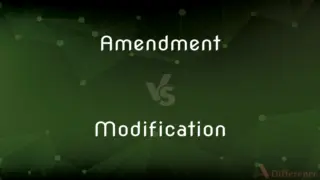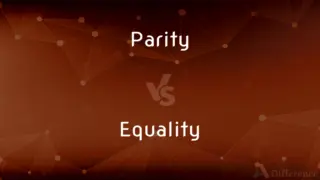Since vs. Because — What's the Difference?
By Tayyaba Rehman — Updated on October 3, 2023
"Since" primarily indicates a time from a point in the past until now or provides a causation reason. "Because" mainly provides a reason or explanation for something. Both can connote causation but differ in additional meanings and usage.

Difference Between Since and Because
Table of Contents
ADVERTISEMENT
Key Differences
"Since" and "Because" can both denote a form of causation, yet they delineate different contexts and applications within the English language. "Since" doubles as a temporal and causal conjunction, offering a bridge to correlate events or reasons within time frameworks or logical arguments. Contrarily, "Because" steadfastly provides reasons or explanations, leading towards understanding or explaining the 'why' of situations or actions without implying a temporal context.
When it comes to dissecting chronological events or periods, "Since" steps into the spotlight by describing a point in time until another moment or the present, sculpting a temporal landscape. "Because" doesn’t delve into such temporal nuances and steadfastly maintains its role as a pillar for providing reasons, devoid of any time-related implications, thus demonstrating its unswerving commitment to causation alone.
In a sentence where cause is the core, "Since" might sow a seed of ambiguity due to its dual role, occasionally necessitating further clarification regarding whether it’s time or causation being referred to. "Because," with its clear-cut orientation towards reason-giving, circumvents this ambiguity, giving a straight pathway to understanding the rationale or explanation behind an action or state.
Further, the elegance of "Since" is revealed when elucidating ongoing events or states that have been true from a certain point in time and continue to hold validity. "Because," despite its clarity in providing reasons, doesn’t envelop such ongoing temporal circumstances within its scope, demonstrating a clear boundary in its semantic field.
Although "Since" and "Because" can sometimes be used interchangeably in casual discourse when denoting reason, a close examination reveals their distinct pathways: "Since" weaving through time and reason, and "Because" standing firmly as a beacon of rationale and explanation.
ADVERTISEMENT
Comparison Chart
Basic Meaning
Indicates time or causation
Primarily provides reason or explanation
Temporal Context
Often used to discuss time intervals
Not used to express time
Cause Explanation
Can explain cause but may imply time
Directly and clearly explains cause
Common Use
Frequently used in both time and cause contexts
Commonly used to give reasons
Example Usage
“Since 2010” or “Since it rained”
“Because it rained”
Compare with Definitions
Since
In the intervening period from a time.
He has grown taller since last year.
Because
For the reason that.
I slept because I was tired.
Since
As from a particular point in time.
It has been sunny since Monday.
Because
In order that.
He spoke loudly because everyone could hear.
Since
Following after a time.
She has been happier since leaving that job.
Because
As a result of the fact that.
She smiled because she was happy.
Since
Considering the fact that.
Since it’s late, we should leave.
Because
As being the reason.
I must go because duty calls.
Since
Continuously from a time.
They have been friends since childhood.
Because
For the reason that; since.
Since
From then until now or between then and now
They left town and haven't been here since.
Because
(archaic) For the reason that.
Since
Before now; ago
A name long since forgotten.
Because
On account of, for sake of.
My life is ruined because of you!
Since
After some point in the past; at a subsequent time
My friend has since married and moved to California.
Because
(by ellipsis) Used alone to refuse to provide a full answer a question begun with "why", usually taken as an anapodoton of the elided full phrase "Because I said so".
Since
Continuously from
They have been friends since childhood.
Because
By or for the cause that; on this account that; for the reason that.
I hid myself because I was afraid.
Since
Intermittently from
She's been skiing since childhood.
Because
As is known, inferred, or determined from the fact that.
It must be broken, because I pressed the button and nothing happened.
I don't think he is a nice person, because he yells at people for no reason.
Since
During the period subsequent to the time when
He hasn't been home since he graduated.
Because
(obsolete) So that, in order that.
Since
Continuously from the time when
They have been friends ever since they were in grade school.
Because
On account of, because of.
He rejected me because revenge, I guess.
It doesn't work because reasons.
Since
Inasmuch as; because
Since you're not interested, I won't tell you about it.
Because
By or for the cause that; on this account that; for the reason that.
Since
From a specified time in the past.
I met him last year, but haven't seen him since.
A short/long time since
Because
In order that; that.
And the multitude rebuked them because they should hold their peace.
Because of these things cometh the wrath of God upon the children of disobedience.
Since
From: referring to a period of time ending in the present and defining it by the point in time at which it started, or the period in which its starting point occurred.
Because
To introduce a reason.
I exercise because it’s healthy.
Since
Continuously during that period of time.
I have known her since last year.
Since
At certain points during that period of time.
Since
From the time that.
I have loved you since I first met you.
Since
Because.
Since you didn't call, we left without you.
Since
(obsolete) When or that.
Since
From a definite past time until now; as, he went a month ago, and I have not seen him since.
We since become the slaves to one man's lust.
Since
In the time past, counting backward from the present; before this or now; ago.
How many ages since has Virgil writ?
About two years since, it so fell out, that he was brought to a great lady's house.
Since
When or that.
Do you remember since we lay all night in the windmill in St. George's field?
Since
From the time of; in or during the time subsequent to; subsequently to; after; - usually with a past event or time for the object.
The Lord hath blessed thee, since my coming.
I have a model by which he build a nobler poem than any extant since the ancients.
Since
Seeing that; because; considering; - formerly followed by that.
Since that my penitence comes after all,Imploring pardon.
Since truth and constancy are vain,Since neither love, nor sense of pain,Nor force of reason, can persuade,Then let example be obeyed.
Common Curiosities
Can “Since” indicate time?
Yes, “Since” can indicate a point in time from which something has been occurring.
Can “Since” lead to ambiguity?
Yes, “Since” might be unclear in some contexts due to its dual meanings (time and cause).
Is “Because” always followed by a reason?
Typically, yes. “Because” is used to introduce the reason or cause of an action or situation.
Are “Since” and “Because” interchangeable?
Sometimes in casual speech, but “Since” can imply time and “Because” explicitly gives a reason.
Is “Because” specific to causation?
Yes, it directly provides reasons or explanations without implying time.
Is “Because” used in formal writing?
Yes, “Because” is widely used in both formal and informal contexts to give reasons.
Can “Since” reference the future?
No, "Since" typically relates to past points in time or causal relationships, not the future.
Can "Since" mean "Because"?
In some contexts, "Since" can imply a reason like "Because," but it can also imply time.
Does “Because” convey time?
No, “Because” predominantly provides reasons, not time intervals.
Can “Since” be used in different tenses?
Yes, "Since" can be used in various tenses to depict ongoing actions or states from a past point.
Can “Since” indicate an ongoing state?
Yes, “Since” can express a continuous state from a past point in time to the present.
Can “Because” start a sentence?
While some consider it informal, starting a sentence with "Because" is grammatically correct.
Can “Because” imply time?
No, “Because” is not used to imply time, but rather to give a reason or cause.
How does “Because” relate to consequence?
"Because" provides the reason that leads to a particular consequence or result, explaining the ‘why’.
Is “Since” used in cause and effect?
Yes, "Since" can imply causation, but may also imply a time element, leading to possible ambiguity.
Share Your Discovery

Previous Comparison
Amendment vs. Modification
Next Comparison
Parity vs. EqualityAuthor Spotlight
Written by
Tayyaba RehmanTayyaba Rehman is a distinguished writer, currently serving as a primary contributor to askdifference.com. As a researcher in semantics and etymology, Tayyaba's passion for the complexity of languages and their distinctions has found a perfect home on the platform. Tayyaba delves into the intricacies of language, distinguishing between commonly confused words and phrases, thereby providing clarity for readers worldwide.















































